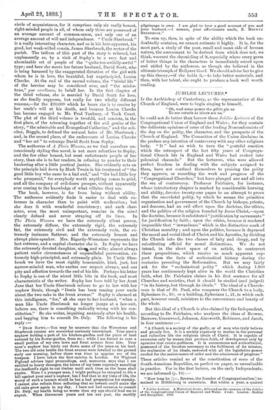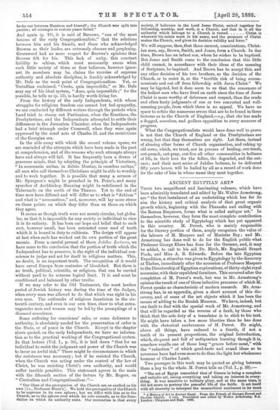JUBILEE LECTURES.* Ii' the Archbishop of Canterbury, as the representative
of the Church of England, were to begin singing to himself, "Oh, wad some power the gif tie gie us To see oursels as ithers see us,"
he could not do better than borrow these Jubilee Lectures of the Congregational Union of England and Wales ; for they contain the deliberate opinions of some of the leading Nonconformists of the day on the polity, the character, and the prospects of the Church of England. The Committee of the Union disclaims in the preface any intention of controversy with any other religions
body. " It " had no wish to turn the "grateful emotion which the retrospect of the last fifty years of Congrega- tional Church life in England and Wales had evoked into polemical channels." But the lecturers, who were allowed perfect freedom in dealing with the subjects assigned to them, have not confined themselves to praising the polity they approve, or recording the work and progress of the "Congregational Churches," but have plunged one and all into the srea of controversy. Professor Fairbairn, for instance, whose introductory chapter is marked by considerable learning and ability, devotes twenty-one pages to an attempt to prove that the sacerdotal polity, by which he means the primitive organisation and government of the Church by bishops, priests, and deacons, had an evil effect upon the doctrine, the ethics, and the politics of the religion founded by Jesus Christ,—upon the doctrine, because it substituted" justification by sacraments" for justification by faith ; upon the ethics, because it rendered impossible that " inwardness " which is the distinctive mark of Christian morality ; and upon the politics, because it depraved the moral and social ideal of Christ and his Apostles, by dividing the Church into the two classes of laity and clergy, and by substituting official for moral distinctions. We do not intend, in the short space of an article, to controvert these proposition's, which receive so much apparent sup- port from the facts of ecclesiastical history during the centuries preceding the Reformation. But we may fairly ask for the "ecclesiastical polity" which during 1,800 years has continuously kept alive in the world the Christian faith, what Dr. Fairbairn claims in his first sentence for all Churches and societies, that it should be studied (and judged) "in its history, but through its ideals." The ideal of a Church- man is that of St. Paul, who compares the Church to a body, Ephesians iv., 16; or a building, Ephesians i., 21, in which each part, however small, ministers to the convenience and beauty of the whole.
But this ideal of a Church is also claimed by the Independent, according to Dr. Fairbairn, who analyses the ideas of Browne, Barrowe, Greenwood, Johnson, Ainsworth, Robinson, and Jacob, in four sentences :— " A Church is a society of the godly, or of men who truly believe and piously live. It is a society expressly to realise in the personal and collective life the religious ideals of Christ. It is capable of extension only by means that produce faith, of development only by agencies that create godliness. It is autonomous and authoritative, possessed of the freedom necessary to the fulfilment of its mission, the realisation of its ideals, endowed with all the legislative power needed for the maintenance of order and the attainment of progress."
These articles remind us of the constitution of some of the South-American Republics, so perfect on paper, so unrealisable in practice. For in the first lecture, on the early Independents, we are informed (p. 16) :— "How long he [i.e., Browne, the founder of Congregationalism] re- mained in Middleburg is uncertain. But within a year, a quarrel
• Jubilee Lectures. A Historical Series, delivered on the occasion of the Jubilee of the Congre;ational Union of England and Wales. 2 vols. London Hodder and Stoughton. 1882.
broke out between Harrison and himself ; the Church was split into parties ; all attempts to restore peace failed."
And again (p. 19), it is said of Barrowe, "one of the most famous of the early Congregationalists," that the relations between him and his friends, and those who acknowledged Browne as their leader, are extremely obscure and perplexing. Greenwood had no more respect for Browne's opinions than Browne felt for his. This lack of unity, this constant liability to schism, which must necessarily ensue when each little society of three or four believers, however ignor- ant its members may be, claims the txercise of supreme authority and absolute discipline, is frankly acknowledged by Mr. Dale as the weak point of Congregationalism. Yet, as Tertullian exclaimed, "Credo, quia impossibile," so Mr. Dale may say of his ideal system, " Amo, quia impossibile ;" for the possible, he tells us (p. 53), is hardly worth living for.
From the history of the early Independents, with whose struggles for religions freedom one cannot but feel sympathy, we are conducted by different writers through the periods when Land tried to stamp out Puritanism, when the Erastians, the Presbyterians, and the Independents attempted to settle their differences in the Jerusalem Chamber, when the Independents had a brief triumph under Cromwell, when they were again oppressed by the cruel acts of Charles II. and the restrictions of the Georgian era.
In the able essay with which the second volume opens, we are reminded of the attempts which have been made in the past at comprehension, and of the reasons why such attempts always have and always will fail. It has frequently been a dream of generous minds, that by adopting the principle of Victorinus, "In necessariis unites, in dubiis libertas, in omnibus caritas," all men who call themselves Christians might be able to worship and to work together. It is possible that many a sermon of Mr. Spurgeon's might be preached in St. Peter's, and many speeches of Archbishop Manning might be redelivered in the Tabernacle on the south of the Thames. Yet to the end of time men have differed and will differ as to what is " dubium " and what is " necessarium," and, moreover, will lay more stress on those points on which they differ than on those on which they agree.
It seems as though truth were not merely circular, but globu- lar, so that it is impossible for any society or individual to view it in its entirety. It has been our hope and belief that to each sect, however small, has been entrusted some seed of truth
which it is bound in duty to cultivate. The design will appear at last when each has worked out its own portion of the great mosaic. From a careful perusal of these jubilee Lectures, we have come to the conclusion that the portion of truth which the
Independent has to preserve, is the right of the individual con- science to judge and act for itself in religious matters. This, no doubt, is an important truth. The recognition of it would have saved Europe from centuries of bloodshed. But there is no truth, political, scientific, or religions, that can be carried without peril to its extreme logical limit. It is and must be conditioned and balanced by other truths.
If we may refer to the Old Testament, the most lawless period of Jewish history was during the time of the Judges, when every man was allowed to do that which was right in his own eyes. The outbreaks of religious fanaticism in the six- teenth century, and even in our own time, show to what extra- vagancies men and women may be led by the promptings of a diseased conscience.
Some suffering for conscience' sake, or some deference to authority, is absolutely needed for the preservation of order in the State, or of peace in the Church. Except in the chapter above quoted, on the early Independents, we have no informa- tion as to the practical working of the Congregational system. In that lecture (Vol. I., p. 36), it is laid down "that for an individual to resist the judgment and power of the Church was to incur an awful risk." There might be circumstances in which the resistance was necessary ; but if he resisted the Church, when the Church was acting under the control of the law of Christ, he was resisting Christ's own authority, and would suffer terrible penalties. This statement agrees in the main with the fifteenth section of the lecture by -Mr. Rogers, on "Clericalism and Congregationalism :"—
" Our ideas of the prerogative of the Church are as exalted as his own [i.e., Professor Blunt's]. We bold the prerogative of the Church to be supreme in its own sphere ; but we differ with him as to the Church, as to the sphere over which its rule extends, as to the foun- dation on which its authority rests. Our contention is that every
society, if believers in the Lord Jesus Christ, united together for fellowship, worship, and work, is a Church, and that in it all the authority which belongs to a Church is vested Christ is wherever his saints meet in his name, and the presence of Christ makes the Church, and gives its decision validity and force."
We will suppose, then, that three earnest, conscientious, Christ- ian men, say, Brown, Smith, and Jones, form a Church. In due time, Brown has an infant son, whom he wishes to be baptised. But Jones and Smith come to the conclusion that this little child cannot, in accordance with their ideas of the meaning of Scripture, be baptised. And Brown has to accept this, and any other decision of his two brothers, as the decision of the Church, or to resist it, at the "terrible risk of being excom- municate and cut off from fellowship with Jesus Christ." We may be bigoted, but it does seem to us that the consensus of the holiest men who have lived on earth since the time of Jesus Christ is more worthy of deference and respect, than the crude and often hasty judgments of one or two converted and well- meaning people, from which there is no appeal. We have no.
space to ref-ate the numerous errors that are to be found in these lectures as to the Church of England,—e.g., that she has made a dogged, senseless, and godless opposition to every measure of progress.
What the Congregationalists would have done well to prove is not that the Church of England or the Presbyterians are wrong, but that they themselves are right. Let them, instead of abusing other forms of Church organisation, and raking up old sores, which, we trust, are in process of healing, out-teach, oat-preach, out-pray, out-live all other communities in holiness of life, in their love for the fallen, the degraded, and the out- cast; and their next series of Jubilee lectures, to be delivered fifty years hence, will be hailed by all as a record of work done for the sake of him in whose name they meet together.



































 Previous page
Previous page